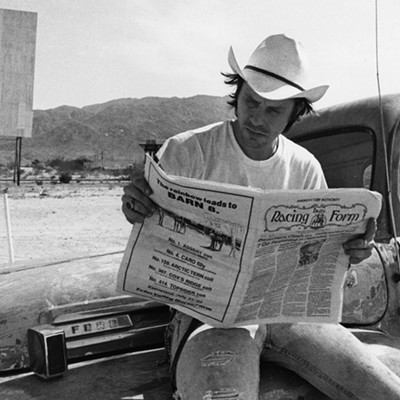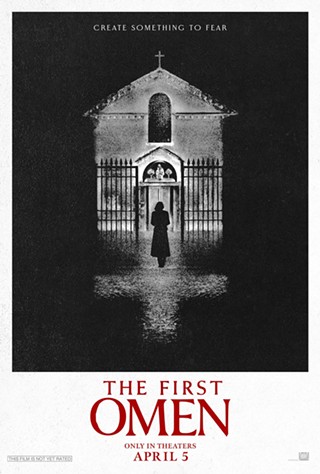Scorsese has been turning out some of the best movies ever made for nearly 40 years, and The Aviator is just another chapter in his incredible history. It's his most ambitious and successful product since Goodfellas, and it would seem that nothing could keep him from taking home that elusive, well-deserved Oscar. Then again, we've been saying that every time he's been nominated since Kevin Costner stole his Goodfellas Oscar for that dopey buffalo movie.
As Howard Hughes in his 20s through early 40s, Leonardo DiCaprio provides yet another reason for his detractors to shut the hell up. Looking a little like Hughes (he's got the forehead for it), DiCaprio manages to convey the genius of the innovator, as well as all of the insecurities and phobias that brought him down.
There's equal parts fearlessness and vulnerability in DiCaprio's characterization, a courageous man who took to the skies and changed air travel, yet was terrified to touch a doorknob when exiting a bathroom. DiCaprio depicts all aspects of Hughes flawlessly, a performance that should garner him an Oscar nomination.
Scorsese starts the story with Hughes directing and producing Hell's Angels (1930), the most expensive film of its time and the first of many obsessions The Aviator will depict. Hughes is sort of a reluctant Los Angeles jetsetter, making time with the likes of Jean Harlow (Gwen Stefani) and eventually having a relationship with Katharine Hepburn (Cate Blanchett). After Hell's Angels, Hughes' obsession with flying takes over as he buys an airline, designs and test-flies his own aircraft, and occasionally crashes in fields and neighborhoods. (The depiction of a plane crash in Beverly Hills is vintage Scorsese.)
Blanchett's excellent performance is a little hard to handle at first. Initially, her characterization seems fit for a Saturday Night Live skit and not a Scorsese movie. Truth is, Hepburn was probably as quirky as this portrayal. Hughes and Hepburn's first verbal sparring on a golf course feels like a Hepburn screwball comedy with Cary Grant. As their relationship becomes more personal, so too does Blanchett's performance. In supporting roles, Alec Baldwin, John C. Reilly and Kate Beckinsale all shine.
While the movie doesn't make it all the way to Hughes' long hair and fingernails phase, it does reach the man's early 40s, when his obsessive compulsive disorder was beginning to get the best of him. A sequence in which he's holed up in a hotel room, storing containers of his own urine and talking to himself, acts as quite the indicator of his descent into madness. A brief respite from the room, during which he testifies before a congressional hearing and flies the famed Spruce Goose for a few seconds, is followed by an ominous hint at the sadness that lay ahead for the man.
This is 2004's best movie, and should result in Oscars for both Scorsese and DiCaprio. My feeling is that Scorsese will get his, but DiCaprio will be shunned in favor of Jamie Foxx for Ray. Still, Titanic boy has proven that This Boy's Life and What's Eating Gilbert Grape were no flukes, with The Aviator being the highlight of a promising career.











